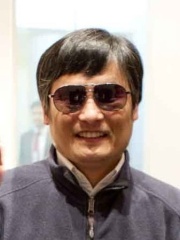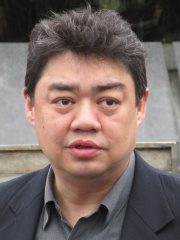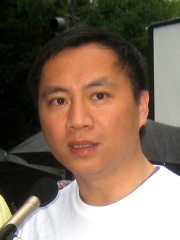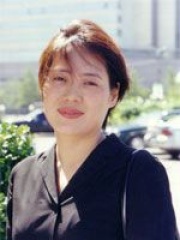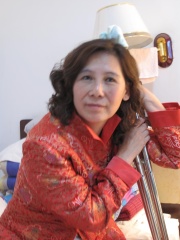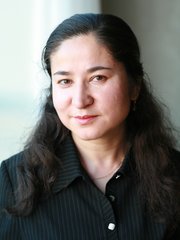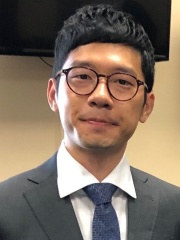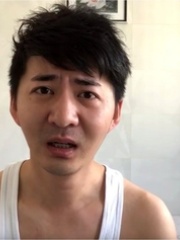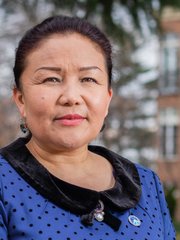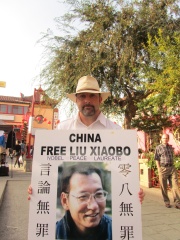
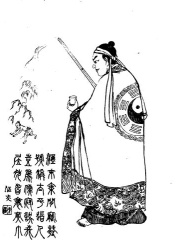
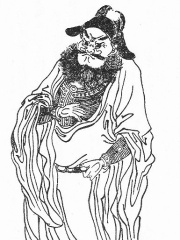
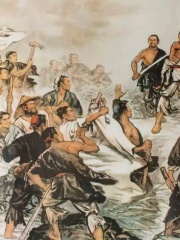
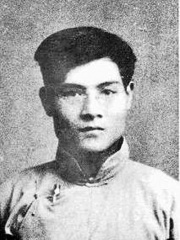
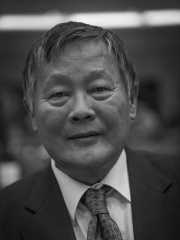
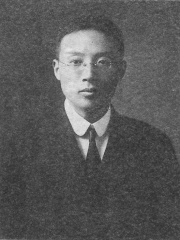
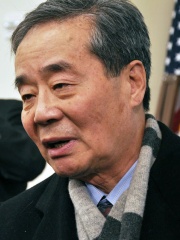
The Most Famous
SOCIAL ACTIVISTS from China
This page contains a list of the greatest Chinese Social Activists. The pantheon dataset contains 840 Social Activists, 21 of which were born in China. This makes China the birth place of the 7th most number of Social Activists behind Germany, and France.
Top 10
The following people are considered by Pantheon to be the top 10 most legendary Chinese Social Activists of all time. This list of famous Chinese Social Activists is sorted by HPI (Historical Popularity Index), a metric that aggregates information on a biography's online popularity. Visit the rankings page to view the entire list of Chinese Social Activists.

1. Liu Xiaobo (1955 - 2017)
With an HPI of 70.93, Liu Xiaobo is the most famous Chinese Social Activist. His biography has been translated into 104 different languages on wikipedia.
Liu Xiaobo (Chinese: 刘晓波; pinyin: Liú Xiǎobō; 28 December 1955 – 13 July 2017) was a Chinese literary critic, human rights activist, philosopher and Nobel Peace Prize laureate who called for political reforms and was involved in campaigns to end Chinese Communist Party one-party rule in China. He was arrested numerous times, and was described as China's most prominent dissident and the country's most famous political prisoner. On 26 June 2017, he was granted medical parole after being diagnosed with liver cancer; he died a few weeks later on 13 July 2017. Liu rose to fame in 1980s Chinese literary circles with his exemplary literary critiques. He eventually became a visiting scholar at several international universities. He returned to China to support the 1989 Tiananmen Square protests and was imprisoned for the first time from 1989 to 1991, again from 1995 to 1996 and yet again from 1996 to 1999 for his involvement on suspicion of inciting subversion of state power. He served as the President of the Independent Chinese PEN Center, from 2003 to 2007. He was also the president of Minzhu Zhongguo (Democratic China) magazine starting in the mid-1990s. On 8 December 2008, Liu was detained due to his participation with the Charter 08 manifesto. He was formally arrested on 23 June 2009 on suspicion of "inciting subversion of state power". He was tried on the same charges on 23 December 2009 and sentenced to eleven years' imprisonment and two years' deprivation of political rights on 25 December 2009. During his fourth prison term, Liu was awarded the 2010 Nobel Peace Prize for "his long and non-violent struggle for fundamental human rights in China." Liu was the first ethnically Chinese person of any citizenship to be awarded the peace prize as well as the first Chinese citizen to be awarded a Nobel Prize of any kind while residing in China. He was the third person to have been awarded the Nobel Peace Prize while in prison or detention, after Germany's Carl von Ossietzky (1935) and Burma's Aung San Suu Kyi (1991).

2. Zhang Jue (200 - 184)
With an HPI of 69.07, Zhang Jue is the 2nd most famous Chinese Social Activist. His biography has been translated into 22 different languages.
Zhang Jue ([ʈʂáŋtɕɥě]; died c. October 184) was a religious leader in ancient China who became a military general and led the Yellow Turban Rebellion during the late Eastern Han dynasty of China. He had a reputation as a Taoist sorcerer capable of performing miracles, and he became extraordinarily popular. Proclaiming the government as corrupt and oppressive, he and his followers attempted to take over the capital city but was thwarted. His name is sometimes read as Zhang Jiao ([ʈʂáŋtɕjàʊ]), since the Chinese character of Zhang's given name can be read as either "Jiao" or "Jue". "Jue" is the traditional or literary reading, while "Jiao" is the modern or colloquial one.

3. Meng Huo (101 - 300)
With an HPI of 66.32, Meng Huo is the 3rd most famous Chinese Social Activist. His biography has been translated into 18 different languages.
Meng Huo (fl. 210s–220s) was a local leader in the Nanzhong region in the state of Shu Han during the Three Kingdoms period of China. He was popularly depicted as a local leader representing the gentries of the Nanzhong region, but some historians doubt his historical existence. Meng Huo's popular image comes from the 14th-century historical novel Romance of the Three Kingdoms, which romanticises the events before and during the Three Kingdoms period. The novel portrays Meng Huo as a southern barbarian tribal leader. He also marries the fictional Lady Zhurong, who claims descent from the fire deity Zhurong. In the Beijing Opera "Dragon and Phoenix Headgear" Zhurong and Meng Huo has a daughter named Huaman.

4. Chen Sheng (250 BC - 208 BC)
With an HPI of 64.37, Chen Sheng is the 4th most famous Chinese Social Activist. His biography has been translated into 17 different languages.
Chen Sheng (died c.January 208 BC), also known as Chen She ("She" being his courtesy name), posthumously known as King Yin, was the leader of the Dazexiang Uprising, the first rebellion against the Qin dynasty. It occurred during the reign of the Second Qin Emperor.
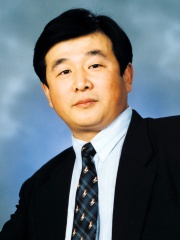
5. Li Hongzhi (b. 1951)
With an HPI of 61.78, Li Hongzhi is the 5th most famous Chinese Social Activist. His biography has been translated into 27 different languages.
Li Hongzhi (Chinese: 李洪志; born 1951 or 1952) is a Chinese religious leader. He is the founder and leader of Falun Gong, or Falun Dafa, a United States–based new religious movement. Li began his public teachings of Falun Gong on 13 May 1992 in Changchun, and subsequently gave lectures and taught Falun Gong exercises across China. In 1995, Li began teaching Falun Gong abroad, and settled as a permanent resident in the United States in 1998. Li's Falun Gong movement gained significant popularity in the 1990s, including in government and qigong circles, but was suppressed by the Chinese government in 1999 after it was officially accused of being a doomsday cult. According to Freedom House, "Today, Chinese citizens who practice Falun Gong live under constant threat of abduction and torture. The name of the practice, its founder Mr. Li Hongzhi, and a wide assortment of homonyms are among the most censored terms on the Chinese internet. Any mention in state-run media or by Chinese diplomats is inevitably couched in demonizing labels.". Li has been also associated with performance arts group Shen Yun ("Divine Rhythm"), and the media organizations The Epoch Times and New Tang Dynasty Television, which operate as extensions of Falun Gong. They have promoted Falun Gong's philosophical beliefs and unfounded conspiracy theories. Li has stated that he believes extraterrestrial aliens from other dimensions walk the Earth and are responsible for introducing technology, war, and immorality. Li says that he is a being who has come to help humankind from the destruction it could face as the result of rampant evil. When asked if he was a human being, Li replied "You can think of me as a human being."

6. Zhang Guotao (1897 - 1979)
With an HPI of 61.35, Zhang Guotao is the 6th most famous Chinese Social Activist. His biography has been translated into 21 different languages.
Zhang Guotao (November 26, 1897 – December 3, 1979) was a Chinese revolutionary who was a founding member of the Chinese Communist Party (CCP) and rival to Mao Zedong. During the 1920s, he studied in the Soviet Union and became a key contact with the Comintern, organizing the CCP labor movement in the United Front with the Kuomintang. From 1931 to 1932, after the Party had been driven from the cities, Zhang was placed in charge of the Eyuwan Soviet. When his armies were driven from the region, he joined the Long March but lost a contentious struggle for party leadership to Mao Zedong. Zhang's armies then took a different route from Mao's and were badly beaten by local Muslim Ma clique forces in Gansu. When his depleted forces finally arrived to join Mao in Yan'an, Zhang continued his losing challenge to Mao, and left the party in 1938. Zhang eventually retired to Canada in 1968. He became a Christian shortly before his death in Scarborough, Ontario (a suburb of Toronto), in 1979. His memoirs provide valuable and vivid information on his life and party history.

7. Wei Jingsheng (b. 1950)
With an HPI of 59.14, Wei Jingsheng is the 7th most famous Chinese Social Activist. His biography has been translated into 29 different languages.
Wei Jingsheng (Chinese: 魏京生; born 20 May 1950) is a Chinese human rights activist and dissident. He is best known for his involvement in the Chinese democracy movement. He is most prominent for having authored the essay "The Fifth Modernization", which was posted on the Democracy Wall in Beijing in 1978. As punishment from the government for writing his manifesto, Wei was arrested and convicted of "counter-revolutionary" activities, and was detained as a political prisoner from 1979 to 1993. Briefly released in 1993, Wei continued to engage in his dissident activities by speaking to visiting journalists, and as punishment, he was imprisoned again from 1994 to 1997, making it a total of 18 years he has spent in various prisons. He was deported to the United States of America on 16 November 1997, on medical parole. Still a Chinese citizen, in 1998 Wei established the Wei Jingsheng Foundation in New York City (now based in Washington, D.C.) whose stated aim is to work to improve human rights and advocate democratisation in China.

8. Chen Qimei (1878 - 1916)
With an HPI of 57.87, Chen Qimei is the 8th most famous Chinese Social Activist. His biography has been translated into 16 different languages.
Chen Qimei (traditional Chinese: 陳其美; simplified Chinese: 陈其美; pinyin: Chén Qíměi; Wade–Giles: Ch'en Ch'i-mei; 17 January 1878 – 18 May 1916), courtesy name Yingshi (英士) was a Chinese revolutionary activist and key figure of the Green Gang, close political ally of Sun Yat-sen, and an early mentor of Chiang Kai-shek. He was one of the founders of the Republic of China, and the uncle of CC Clique leaders Chen Guofu and Chen Lifu.

9. Harry Wu (1937 - 2016)
With an HPI of 57.42, Harry Wu is the 9th most famous Chinese Social Activist. His biography has been translated into 18 different languages.
Harry Wu (Chinese: 吴弘达; pinyin: Wú Hóngdá; February 8, 1937 – April 26, 2016) was a Chinese-American human rights activist. Wu spent 19 years in Chinese labor camps, and he became a resident and citizen of the United States. In 1992, he founded the Laogai Research Foundation.
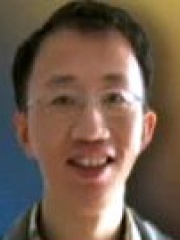
10. Hu Jia (b. 1973)
With an HPI of 52.58, Hu Jia is the 10th most famous Chinese Social Activist. His biography has been translated into 36 different languages.
Hu Jia (Chinese: 胡佳; pinyin: Hú Jiā; born July 25, 1973) is a Chinese civil rights activist and critic of the Chinese Communist Party. His work has focused on the Chinese democracy movement, Chinese environmentalist movement, and HIV/AIDS in the People's Republic of China. Hu is the director of June Fourth Heritage & Culture Association, and he has been involved with AIDS advocacy as the executive director of the Beijing Aizhixing Institute of Health Education and as one of the founders of the non-governmental organization Loving Source. He has also been involved in work to protect the endangered Tibetan antelope. For his activism, Hu has received awards from several European bodies, such as the Paris City Council and the European Parliament, which awarded the Sakharov Prize for Freedom of Thought to him in December 2008. On December 27, 2007, Hu was detained as part of a crackdown on dissent during the Christmas holiday season. Reporters Without Borders said that "The political police have taken advantage of the international community's focus on Pakistan to arrest one of the foremost representatives of the peaceful struggle for free expression in China." The decision to take him into custody was made after peasant leaders in several Chinese provinces issued a manifesto demanding broader land rights for peasants whose property had been confiscated for development. On April 3, 2008, he was sentenced to 3.5 years in jail. Hu pleaded not guilty on charges of "inciting subversion of state power" at his trial in March 2008. His trial and detention garnered international attention, and Hu was described as a political prisoner, and was designated a prisoner of conscience by Amnesty International. He was released on June 26, 2011.
People
Pantheon has 21 people classified as Chinese social activists born between 250 BC and 1993. Of these 21, 14 (66.67%) of them are still alive today. The most famous living Chinese social activists include Li Hongzhi, Wei Jingsheng, and Hu Jia. The most famous deceased Chinese social activists include Liu Xiaobo, Zhang Jue, and Meng Huo. As of April 2024, 3 new Chinese social activists have been added to Pantheon including Tank Man, Rahile Dawut, and Sayragul Sauytbay.
Living Chinese Social Activists
Go to all RankingsLi Hongzhi
1951 - Present
HPI: 61.78
Wei Jingsheng
1950 - Present
HPI: 59.14
Hu Jia
1973 - Present
HPI: 52.58
Chen Guangcheng
1971 - Present
HPI: 51.40
Wu'erkaixi
1968 - Present
HPI: 51.10
Tank Man
HPI: 50.44
Wang Dan
1969 - Present
HPI: 50.17
Guo Jianmei
1961 - Present
HPI: 48.91
Ni Yulan
1960 - Present
HPI: 47.57
Rahile Dawut
1966 - Present
HPI: 45.92
Nathan Law
1993 - Present
HPI: 40.41
Chen Qiushi
1985 - Present
HPI: 39.98
Deceased Chinese Social Activists
Go to all RankingsLiu Xiaobo
1955 - 2017
HPI: 70.93
Zhang Jue
200 - 184
HPI: 69.07
Meng Huo
101 - 300
HPI: 66.32
Chen Sheng
250 BC - 208 BC
HPI: 64.37
Zhang Guotao
1897 - 1979
HPI: 61.35
Chen Qimei
1878 - 1916
HPI: 57.87
Harry Wu
1937 - 2016
HPI: 57.42
Newly Added Chinese Social Activists (2025)
Go to all RankingsOverlapping Lives
Which Social Activists were alive at the same time? This visualization shows the lifespans of the 4 most globally memorable Social Activists since 1700.

